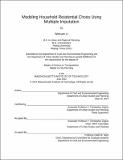| dc.contributor.advisor | P. Christopher Zegras. | en_US |
| dc.contributor.author | Li, Weixuan, S.M. Massachusetts Institute of Technology | en_US |
| dc.contributor.other | Massachusetts Institute of Technology. Department of Urban Studies and Planning. | en_US |
| dc.date.accessioned | 2015-01-05T19:34:36Z | |
| dc.date.available | 2015-01-05T19:34:36Z | |
| dc.date.copyright | 2014 | en_US |
| dc.date.issued | 2014 | en_US |
| dc.identifier.uri | http://hdl.handle.net/1721.1/92596 | |
| dc.description | Thesis: S.M. in Transportation, Massachusetts Institute of Technology, Department of Civil and Environmental Engineering, 2014. | en_US |
| dc.description | Thesis: M.C.P., Massachusetts Institute of Technology, Dept. of Urban Studies and Planning, 2014. | en_US |
| dc.description | This electronic version was submitted by the student author. The certified thesis is available in the Institute Archives and Special Collections. | en_US |
| dc.description | Cataloged from student-submitted PDF version of thesis. | en_US |
| dc.description | Includes bibliographical references (pages 95-98). | en_US |
| dc.description.abstract | Households are one of the core agents in the urban system. Household behavior plays a crucial role in urban system performance and can profoundly shape the urban landscape. This thesis examines households' behavior in the housing market. Current integrated urban systems models provide few insights into the capability of random bidding models in simulating household residential choice behavior; rarely have random bidding models been applied in a micro-simulation context, due to insufficient data. Therefore, the main goal of this thesis is to explore a possible technique - Multiple Imputation - to integrate observations from dissimilar data sets to meet the data requirements of random bidding models of the housing market, and to test the capability of such a model. The data used in this thesis come from two distinct data sets: 1) Singapore's Household Interview Travel Survey 2008, providing household demographic, socioeconomic and travel information; and 2) the Urban Redevelopment Authority's Real Estate Information System, which includes detailed descriptions of attributes of private dwellings that were purchased during 2008. Observations from these data sets, households and dwelling units, are firstly matched using Multiple Imputation; the resulting data are used to estimate a random bidding model using the bid-auction approach in a micro-simulation context - providing a rare example of a microscopic application of random bidding models. This thesis validates the effectiveness of the Multiple Imputation method for matching observations from household and real estate data sets for estimating behavioral models. The estimation of the random bidding model shows that family structure is the most important factor shaping a household's willingness-to-pay for dwelling attributes. Households with children apparently more strongly consider the living environment for their children. Household income influences references as well, but not as much as family structure does. In general, households' willingness-to-pay increase with income level. The limitations of this thesis include the need to and means of grouping households and the few variables to represent dwelling and zonal attributes. Future research should aim to better represent dwelling units and their neighborhoods as well as incorporate more behavioral economics to better understand and predict household behavior in the housing market. | en_US |
| dc.description.statementofresponsibility | by Weixuan Li. | en_US |
| dc.format.extent | 98 pages | en_US |
| dc.language.iso | eng | en_US |
| dc.publisher | Massachusetts Institute of Technology | en_US |
| dc.rights | M.I.T. theses are protected by copyright. They may be viewed from this source for any purpose, but reproduction or distribution in any format is prohibited without written permission. See provided URL for inquiries about permission. | en_US |
| dc.rights.uri | http://dspace.mit.edu/handle/1721.1/7582 | en_US |
| dc.subject | Civil and Environmental Engineering. | en_US |
| dc.subject | Urban Studies and Planning. | en_US |
| dc.title | Modeling household residential choice using multiple imputation | en_US |
| dc.type | Thesis | en_US |
| dc.description.degree | S.M. in Transportation | en_US |
| dc.description.degree | M.C.P. | en_US |
| dc.contributor.department | Massachusetts Institute of Technology. Department of Civil and Environmental Engineering | |
| dc.contributor.department | Massachusetts Institute of Technology. Department of Urban Studies and Planning | |
| dc.identifier.oclc | 898130134 | en_US |
